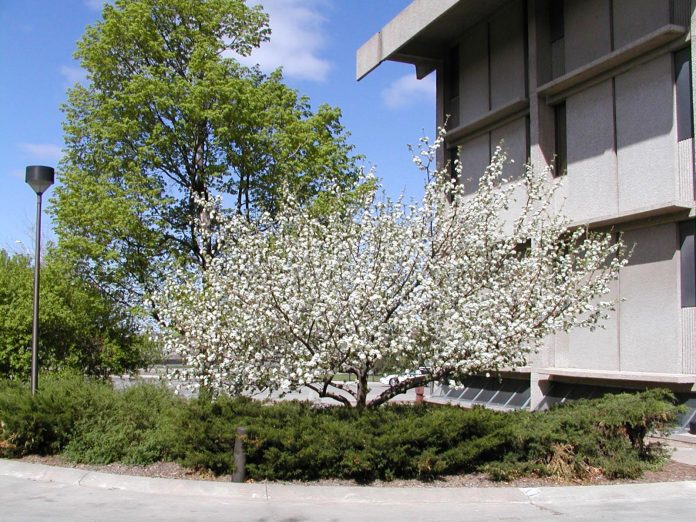The University of Nebraska-Lincoln removed its original Newton Apple Tree, but its roots remain strong through a pair of clones and Landscape Services’ robust tree manager.
Nebraska U is one of 14 places in the United States that has a Flower of Kent tree, believed to be the direct descendant of the famous apple tree that inspired Sir Isaac Newton’s theory of gravity. The tree, one of the oldest and most treasured arbors on campus, was cloned in 2015 and both of its descendants now reside outside of Jorgensen Hall. Citing concerns about the tree’s health and public safety, the university made the decision to remove the iconic arbor that was located at the southwest corner of the Behlen laboratory building.
“The tree’s health has declined,” said Jeff Culbertson, director of Landscape Services. “It had several large dead branches and it was near pedestrian areas so we felt it had receded enough that it was time for us to remove it.”
Nebraska received its original Newton Apple Tree in 1991 from retired physician Edward Lyman and former horticulture professor Joseph Young. They contacted Richard Keesing of the University of York, who had examined the tree. York had a transplant of the apple tree that grew on Newton’s property, and a cutting was shipped to the university and planted outside of Behlen Labs.
The legacy of the tree will remain. In 2015, Landscape Services created two genetic duplicates of the tree, and the duplicates were planted outside Jorgensen Hall by Landscape Services. At this location, the tree is valued by the Faculty of Physics and Astronomy for its legendary contribution to science.
The clones are just one example of Landscape Service’s commitment to preserving the historic trees on campus.
“I think having trees with a story is interesting for people on campus,” Culbertson said. “I think it’s important for new students and I think it’s important for people who work on campus to know that there’s this connection of the past to the future. Students studied or relaxed under an important tree for generations, or graduated and had their picture taken by an important tree. Our Nursery Superintendent, Laurence Ballard, does a great job of finding and propagating significant trees on campus so that we will continue to have them represented on campus in the future.”
In addition to historic trees, Landscape Services cares for all of the more than 9,000 trees that stand throughout campus to enhance campus beauty and functionality.
“Trees enhance the overall campus landscape,” Culbertson said. “They create space and contact points for people on campus. From an atmospheric point of view, it’s a place to escape the heat in the summer and it offers students another place to study.”
The university has a long-standing commitment to tree conservation and was one of the first nine universities to receive a Tree Campus in 2008 USA Designation – an honor it has upheld for 14 years. On average, the university recovers 10 trees per year, of which about 100 are culled annually due to weather damage, disease or health problems, and at least 110 are planted every 12 months.
“We strive for a diverse tree population,” Culbertson said. “Diversity matters because it means populations are more resilient and better able to cope with a variety of conditions. When we have too much of one species of tree and when there is a specific pest, weather or situation, then those trees are more susceptible to damage that affects our overall population. We try to keep the numbers under 10 percent so that if something significant happens, like the Emerald Ash Borer attacks, our entire city forest isn’t affected.”
And Landscape Services’ care and commitment to campus trees goes beyond just beautifying the University of Nebraska-Lincoln campus.
“From a sustainability perspective, which is more important than ever, it helps reduce building temperatures and protect buildings from wind, heat and cold. I think their purposes have become more relevant to campus and in our communities.”
news.unl.edu
https://news.unl.edu/newsrooms/today/article/newton-apple-tree-showcases-landscape-services-management-success/















